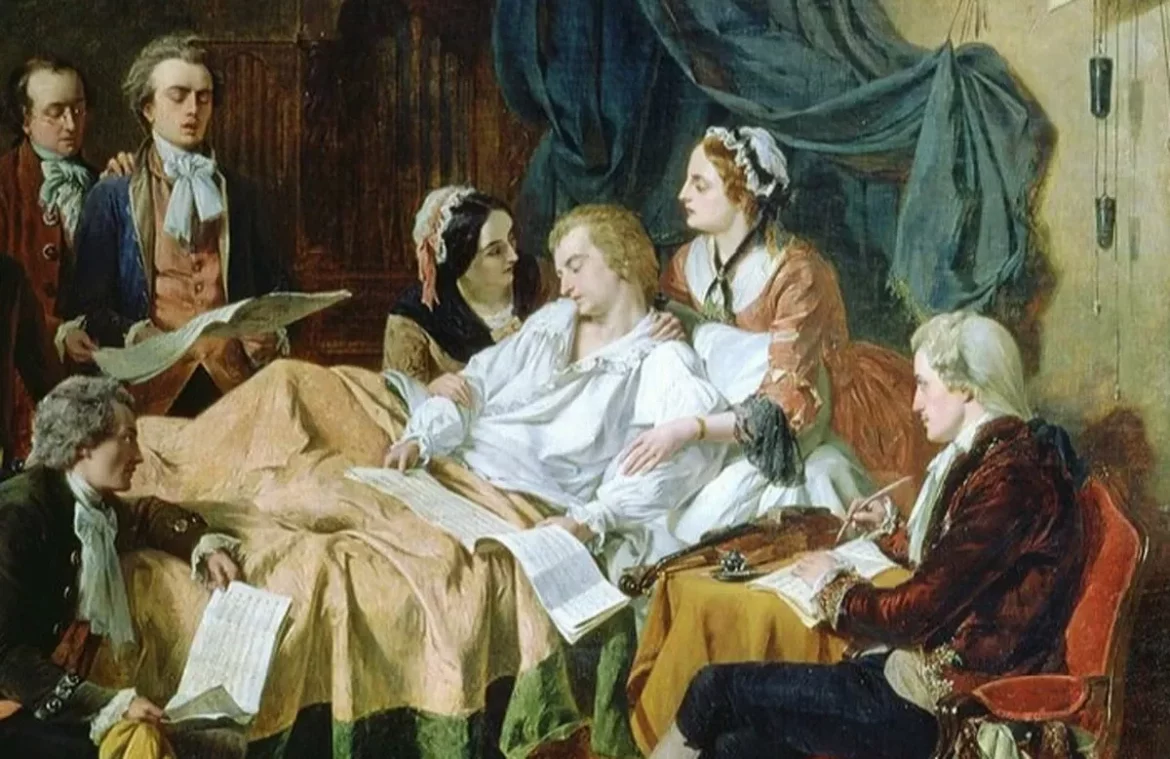The world-renowned composer Wolfgang Amadeus Mozart left an indelible mark on the world of music with his exceptional talent and enduring masterpieces. However, his life was tragically cut short at the young age of 35, leaving behind a mystery surrounding the cause of his death. Despite various theories and speculations, historians and medical experts continue to grapple with the question: what did Mozart die of? Delving into the final days of this musical genius offers a glimpse into the enigmatic circumstances surrounding his untimely passing and the enduring intrigue that surrounds his death.
1.The Final Days of a Musical Genius
In the winter of 1791, Mozart’s health began to decline significantly, marking the start of his final chapter. He complained of various troubling symptoms, including fever, fatigue, and swelling, which progressively worsened with each passing day. As his condition deteriorated, he struggled to complete his final works, including the enigmatic Requiem. Fearing for his life, Mozart became increasingly introspective, with a sense of impending doom looming over him. The contrast between his creative fervor and his ailing physical state adds a poignant dimension to his final days.
2.Theories and Speculations
Throughout the centuries, a multitude of theories have emerged, attempting to shed light on the cause of Mozart’s death. Some speculated that he fell victim to a contagious disease, such as rheumatic fever or smallpox, while others suspected mercury poisoning due to the common use of mercury-based medications at the time. Certain historians even pointed fingers at Mozart’s supposed rival, Antonio Salieri, alleging foul play. However, none of these theories have been conclusively proven, leaving room for further investigation. This diverse array of hypotheses reflects the enduring fascination with uncovering the truth behind the great composer’s passing.
3.Mozart’s Requiem: A Swansong of Mystery
One of the most enigmatic aspects of Mozart’s death is his unfinished Requiem. Commissioned by a mysterious figure, Mozart became consumed by the composition, often mentioning it as if it were intricately tied to his fate. Despite his deteriorating health, he toiled away, driven by an almost prophetic sense of urgency. Upon his death, the Requiem remained incomplete, leaving musicologists to wonder if the composition held any clues to the cause of his demise. The haunting melodies and poignant themes of the Requiem add an air of mystique to the circumstances surrounding Mozart’s passing.
4.Medical Perspectives and Modern Diagnosis
In recent times, medical experts have attempted to diagnose Mozart’s condition based on historical accounts and the symptoms he exhibited. Some believe he might have succumbed to a streptococcal infection, leading to rheumatic fever, a possibility that aligns with his symptoms. Others suggest that Mozart suffered from a chronic kidney disease, which could have been aggravated by various factors, including heavy metal exposure from his occupation as a musician. This intersection of medical science and historical analysis highlights the challenges in deciphering the cause of death of historical figures centuries after their passing.
5.The Curse of the Mozart Family
Mozart’s untimely death was not an isolated incident within his family. The Mozart lineage was plagued by a series of early deaths, leading to the emergence of the infamous “Mozart curse.” This notion fueled further speculation about supernatural forces influencing the lives and deaths of these gifted musicians. However, the concept of a curse remains highly controversial and has not been substantiated with concrete evidence. Nonetheless, it adds an intriguing layer of folklore and superstition to the exploration of Mozart’s mysterious death.
6.Salieri’s Role: Fact or Fiction?
The notion of Mozart’s rival, Antonio Salieri, being involved in his death has captured the imaginations of many. Some historical accounts suggest a possible rivalry between the two composers, but there is little concrete evidence to support the idea that Salieri had any direct involvement in Mozart’s demise. Many experts dismiss this theory as mere speculation, fueled by fiction and folklore. The enduring allure of this theory lies in its potential to weave a dramatic narrative around Mozart’s demise, reminiscent of a gripping historical novel.
7.Historical Context: Medicine and Mysteries of the 18th Century
To understand the circumstances surrounding Mozart’s death fully, it is essential to consider the medical knowledge and practices of the 18th century. Medical science during this era was rudimentary and often based on trial and error. Treatments involving harmful substances like mercury were prevalent, and the true causes of many illnesses were not fully understood. This historical context adds complexity to the task of identifying Mozart’s cause of death accurately. It serves as a reminder of the significant advances in medical science over the centuries and the challenges in interpreting historical medical records.
Conclusion
Despite the passage of centuries and countless investigations, the exact cause of Mozart’s death remains shrouded in mystery. His untimely demise continues to intrigue scholars, medical experts, and music enthusiasts alike, as they grapple with the enigma of the musical genius’ final days. Mozart’s legacy endures, and his death serves as a poignant reminder of the fragility of human life, leaving us to cherish the unparalleled brilliance he bestowed upon the world during his short existence. As long as the mystery persists, the allure of Mozart’s life and death will endure, immortalizing him as a timeless enigma in the annals of history.

